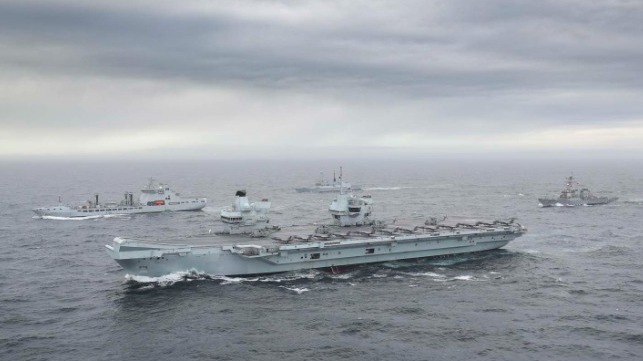UK Has a Deployable Carrier Strike Group for the First Time in Decades

For the first time in nearly four decades, the Royal Navy has a carrier strike group that is ready to deploy. On Monday, the UK Ministry of Defense announced the achievement of initial operating capability (IOC) for the HMS Queen Elizabeth carrier strike group, which means that all elements - fighters, radars, air defense systems, pilots and crewmembers - are considered ready for operations.
"This is a hugely significant milestone for HMS Queen Elizabeth, the Royal Navy and the whole country. This achievement is a testament to the determination of our service personnel and industry workforce who have delivered this first-rate military capability, a capability held by only a handful of nations," said Defense Minister Jeremy Quin in a statement. "I wish the entire Carrier Strike Group well ahead of their first operational deployment this year."
According to the Royal Navy, the Queen Elizabeth will deploy on a globe-spanning itinerary to the Mediterranean, Indian Ocean and East Asia later in the year. Full operational capability (FOC) is expected in 2023.
An early iteration of the Queen Elizabeth strike group conducted exercises in the North Sea last October. Nine ships, 15 fighter jets, 11 helicopters and 3,000 personnel from the UK, US and the Netherlands participated in the exercise - the largest and most powerful European-led maritime force assembled in nearly 20 years. It also represented the largest carrier strike group fielded by the UK since the 1980s.
The U.S. Navy destroyer USS The Sullivans and the Dutch Navy vessel HNLMS Evertsen formed part of the carrier's escort squadron during the maneuvers, and a detachment of 10 U.S. Marine Corps F35-B fighters rounded out her air wing.

that matters most
Get the latest maritime news delivered to your inbox daily.
“The new UK Carrier Strike Group is the embodiment of British maritime power, and sits at the heart of a modernised and emboldened Royal Navy," said Commodore Steve Moorhouse, the strike group's commander, during the exercise last year. “Protected by a ring of advanced destroyers, frigates, helicopters and submarines, and equipped with fifth generation fighters, HMS Queen Elizabeth is able to strike from the sea at a time and place of our choosing."
The UK is also embarking on a procurement program to acquire more dry stores auxiliaries, an essential component of power projection for a large carrier strike group. At present, the Royal Navy only has one in active service, the 26-year-old RFA Fort Victoria. It has already replaced its fleet oilers with four new South Korean-built hulls, and a new tender for a Fleet Solid Support Ship opened in October. Controversially, it is open to proposals that include a foreign build element, so long as “a significant portion of the build and assembly work" is retained in the United Kingdom.
